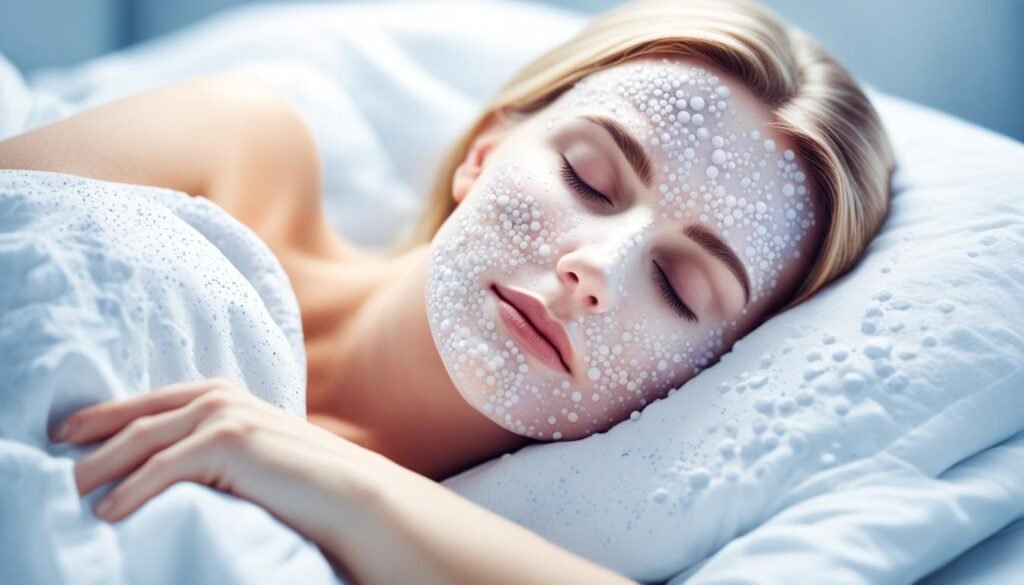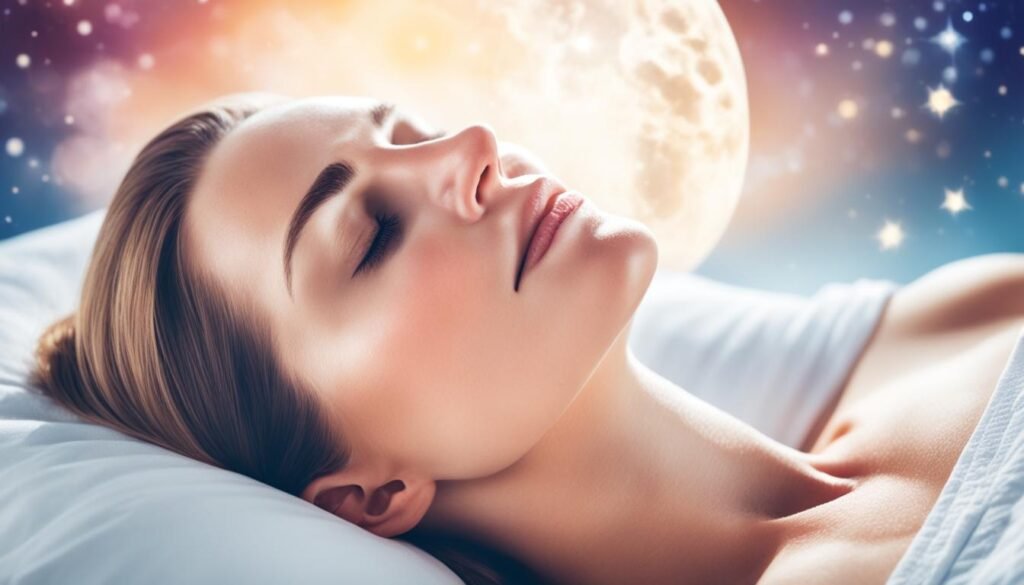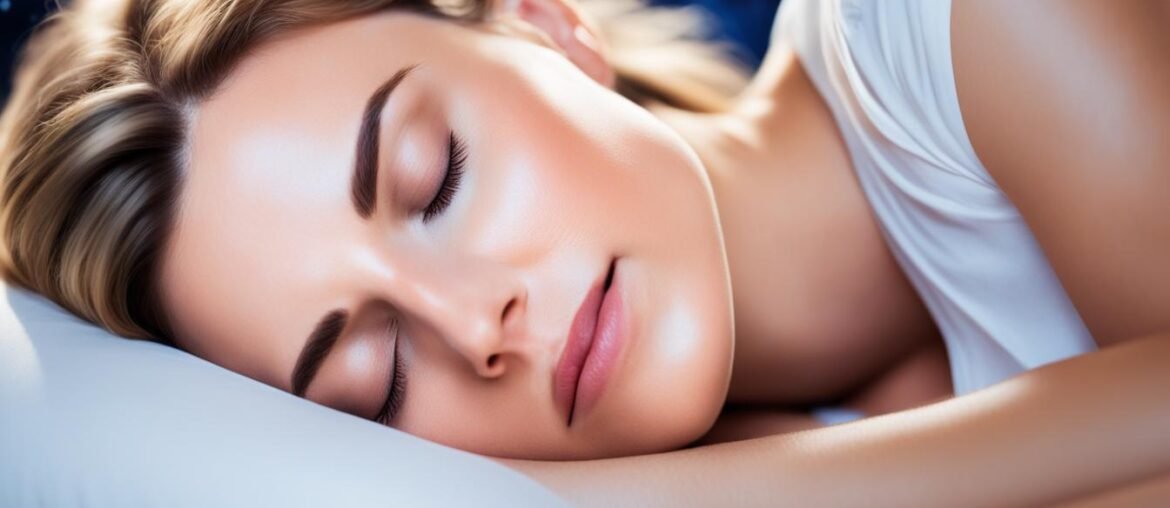Did you know that the quality of your sleep can directly impact the health and appearance of your skin? It’s true! Multiple studies have shown that getting adequate sleep plays a crucial role in the anti-aging process of the skin.
When you don’t get enough sleep or your sleep quality is poor, it can lead to increased signs of aging, diminished skin barrier function, and lower satisfaction with appearance. On the other hand, prioritizing good sleep allows for the renewal and repair of the skin, increases blood flow, promotes collagen production, and enhances recovery from environmental damage.
If you’re looking to maintain youthful and radiant skin, it’s clear that sleep is an essential component of your skincare routine. In this article, I will delve deeper into the relationship between sleep and skin health, exploring the benefits of sleep for skin rejuvenation, wrinkle prevention, collagen production, and more.
Key Takeaways:
- Sleep plays a crucial role in maintaining the health and appearance of your skin.
- Adequate sleep contributes to the anti-aging process of the skin, promoting collagen production and enhancing skin cell regeneration.
- Poor sleep quality can lead to increased signs of aging, such as wrinkles, fine lines, and skin sagging.
- Sleep allows the skin to repair, recover, and protect itself from environmental damage.
- Prioritizing quality sleep is essential for maintaining youthful and healthy skin.
The Effects of Poor Sleep on Skin Health
Poor sleep quality can have significant negative effects on skin health. Studies have shown that inadequate sleep can lead to increased signs of aging, such as wrinkles, fine lines, and skin sagging. It can also impair collagen production, which is essential for maintaining skin elasticity and firmness. Furthermore, poor sleep can hinder the process of skin cell regeneration, resulting in dull and sluggish-looking skin. Lack of sleep can also lead to decreased skin elasticity, making it more prone to sagging and wrinkles. It is crucial to prioritize quality sleep to ensure optimal skin health.
During sleep, the body undergoes essential restorative processes that have a direct impact on the health and appearance of the skin. From collagen production to skin cell regeneration, sleep plays a crucial role in maintaining the youthful and vibrant look of the skin. Adequate sleep helps promote the production of collagen, a protein that gives the skin its elasticity and strength. Collagen production is highest during sleep, ensuring that the skin remains firm and supple.
Furthermore, sleep is essential for skin cell regeneration and repair. While we sleep, our bodies produce higher levels of growth hormone, which aids in the rejuvenation and renewal of skin cells. The increase in blood flow during sleep also helps deliver vital nutrients and oxygen to the skin, promoting a healthy and radiant complexion.
Poor sleep can disrupt these essential processes, leading to visible signs of aging and unhealthy skin. When we don’t get enough quality sleep, our bodies produce less collagen, leaving the skin more susceptible to wrinkles and sagging. Sleep deprivation also impairs the skin’s ability to regenerate new cells, resulting in a dull and lackluster complexion. In addition, inadequate sleep can cause increased inflammation in the body, leading to skin conditions such as acne and eczema.
It is crucial to prioritize sleep and establish healthy sleep habits to maintain optimal skin health. Aim for 7-9 hours of sleep each night, establishing a regular sleep routine and creating a relaxing environment conducive to sleep. Avoid electronic devices before bed, as they can disrupt your sleep patterns. Invest in a comfortable mattress and pillow to ensure proper support and alignment of the body. By incorporating these habits into your lifestyle, you can promote better sleep and enjoy the skin benefits that come with it.
| Effects of Poor Sleep on Skin Health | Effects of Quality Sleep on Skin Health |
|---|---|
|
|
The Link Between Sleep and Skin Repair

During sleep, your body goes through a remarkable process of repair and rejuvenation. And guess what? Your skin benefits from this regenerative process as well! Adequate sleep plays a vital role in the repair and rejuvenation of your skin cells, helping to reduce the appearance of wrinkles and fine lines. Let’s explore how sleep promotes skin rejuvenation, prevents wrinkles, and supports skin cell regeneration.
The Benefits of Sleep for Skin Rejuvenation
Sleep is like a natural fountain of youth for your skin. When you get enough sleep, your body produces collagen and elastin, two proteins that are essential for maintaining smooth and supple skin. Collagen provides structural support, while elastin helps the skin bounce back and maintain its elasticity. As a result, your skin appears firmer, tighter, and more youthful.
Additionally, sleep improves blood circulation to your skin, allowing it to receive vital nutrients and oxygen. This enhanced blood flow helps nourish your skin cells, giving your complexion a healthier and more radiant glow. So, don’t underestimate the power of a good night’s sleep for achieving that natural, youthful radiance!
Sleep as a Wrinkle Prevention Strategy
Wrinkles are the nemesis of smooth, youthful skin. But fear not, because sleep can help in the battle against those pesky lines. When you sleep, your body releases growth hormones that stimulate the production of new skin cells. As a result, your skin can repair itself more effectively, reducing the appearance of fine lines and wrinkles.
Moreover, during sleep, your skin’s barrier function is strengthened. This means that your skin is better able to retain moisture and protect itself from environmental aggressors like UV rays and pollution. By preventing damage to your skin, quality sleep helps prevent the formation of wrinkles and keeps your skin looking fresh and youthful.
Sleep and Skin Cell Regeneration
Your skin is constantly exposed to external stressors that can damage its cells. However, during sleep, your body initiates a process of cellular regeneration, allowing damaged cells to be repaired or replaced. This regenerative phase is crucial for maintaining the overall health and vitality of your skin.
When you sleep, your body allocates resources to repair and renew your skin cells. The result? Improved skin texture, a reduction in blemishes, and a more even skin tone. So, make sure you prioritize quality sleep to give your skin the time it needs to revitalize and regenerate.
| Sleep and Skin Repair | Benefits |
|---|---|
| Promotes collagen and elastin production | Firms and tightens the skin |
| Improves blood circulation | Enhances skin radiance |
| Stimulates skin cell regeneration | Reduces the appearance of wrinkles and fine lines |
| Strengthens the skin’s barrier function | Protects against environmental damage |
By embracing the power of sleep, you can unlock the incredible benefits of skin rejuvenation, wrinkle prevention, and cell regeneration. Take care of your skin and prioritize quality sleep for a healthier, more youthful complexion.
Sleep’s Impact on Skin Barrier Function
Sleep plays a vital role in maintaining the integrity of the skin’s barrier function. A well-rested body is better equipped to produce collagen, the protein responsible for maintaining the skin’s structure and strength. Collagen production is highest during sleep, allowing the skin to repair any damage and provide a protective barrier against environmental stressors. Without sufficient sleep, the skin may become more vulnerable to damage and less able to recover effectively. Therefore, prioritizing sleep is crucial for maintaining a youthful and resilient skin barrier.
Collagen is a structural protein that provides support and strength to the skin. It helps maintain the skin’s elasticity, prevents sagging, and minimizes the appearance of wrinkles. During sleep, the body undergoes a process of collagen synthesis, where new collagen fibers are produced to replace old or damaged ones. This process is essential for maintaining the integrity of the skin’s barrier function and overall skin health.
Adequate sleep also allows the skin to repair any damage caused by environmental factors such as UV radiation and pollution. During sleep, blood flow to the skin increases, delivering nutrients and oxygen to support the repair and rejuvenation process. Lack of sleep can compromise this process, leading to impaired skin barrier function and a weakened defense against external aggressors.
Furthermore, sleep deprivation has been shown to increase inflammation in the body, including the skin. Chronic inflammation can disrupt the skin’s barrier function and contribute to various skin conditions, such as acne, eczema, and psoriasis. By getting enough sleep, you can help reduce inflammation and support a healthy skin barrier.
It is important to note that the quality of sleep also matters. Deep, uninterrupted sleep allows for optimal collagen production and skin rejuvenation. Establishing a bedtime routine, creating a sleep-friendly environment, and practicing good sleep hygiene can all contribute to better sleep quality and, ultimately, healthier skin.
The Role of Antioxidants
In addition to prioritizing sleep, incorporating antioxidants into your skincare routine can further support the health and integrity of your skin barrier. Antioxidants help neutralize free radicals, unstable molecules that can damage collagen and other components of the skin. By protecting against oxidative stress, antioxidants can enhance the skin’s resilience and promote a more youthful appearance.
A Healthy Diet for Healthy Skin
Eating a balanced and nutrient-rich diet can also contribute to the health of your skin barrier. Foods rich in vitamins and minerals, such as fruits, vegetables, whole grains, and lean proteins, provide the necessary building blocks for collagen synthesis and overall skin health. Including foods that are high in antioxidants, such as berries, leafy greens, and nuts, can further support the skin’s defense against oxidative stress.
The Benefits of Beauty Sleep for Skin

Beauty sleep is not just a catchy phrase; it has real benefits for the skin. Adequate sleep allows for increased blood flow to the skin, delivering necessary nutrients and oxygen. This enhanced blood circulation contributes to a healthier complexion, giving the skin a youthful and radiant appearance. Additionally, sleep promotes the production of collagen and elastin, which help to prevent the formation of wrinkles and improve overall skin elasticity. By prioritizing quality sleep, you can harness the power of beauty sleep to enhance the rejuvenation and anti-aging process of your skin.
Tips for Optimizing Your Beauty Sleep
To maximize the benefits of sleep for your skin and maintain its youthful glow, it is essential to establish healthy sleep habits. Here are a few tips to help you optimize your beauty sleep:
- Create a soothing sleep environment: Ensure your bedroom is dark, quiet, and at a comfortable temperature. Consider using blackout curtains, earplugs, or white noise machines to minimize disturbances that can disrupt your sleep.
- Stick to a consistent sleep schedule: Establish a regular sleep routine by going to bed and waking up at the same time each day, even on weekends. This helps regulate your body’s internal clock and promotes better sleep quality.
- Avoid stimulants: Limit your consumption of caffeine and alcohol, especially in the evening. These substances can interfere with your sleep patterns and reduce the quality of your rest.
- Unwind before bed: Engage in relaxing activities before sleep, such as reading a book, taking a warm bath, or practicing deep breathing exercises. This helps signal to your body that it’s time to wind down and prepares you for a restful slumber.
- Establish a bedtime ritual: Develop a calming routine that helps you transition from the busyness of the day to a state of relaxation. This could include gentle stretching, listening to soothing music, or practicing mindfulness or meditation.
By incorporating these tips into your daily routine, you can optimize your beauty sleep and support the health and vitality of your skin.
| Sleep Benefits | How It Enhances Skin |
|---|---|
| Promotes collagen production | Helps maintain skin elasticity and firmness |
| Supports skin cell regeneration | Reduces the appearance of wrinkles and fine lines |
| Increases blood flow to the skin | Delivers essential nutrients and oxygen for a healthy complexion |
Optimizing your beauty sleep is essential for maintaining youthful and radiant skin. The tips provided above can help you establish healthy sleep habits and reap the full benefits of sleep for your skin’s health and beauty.
The Relationship Between Sleep and Sun Exposure

Sun exposure can have a significant impact on the health and appearance of the skin. It is important to avoid direct sun exposure while sleeping or napping, as it can lead to damage and premature aging. Sleeping in a room with blackout curtains or ensuring that your bed is not directly in the sun’s path can help protect your skin from harmful UV rays. Additionally, it is crucial to wear sunscreen during the day, even if most of your sun exposure occurs while you sleep. By minimizing sun exposure during sleep, you can help prevent wrinkles, sunspots, and other signs of sun damage.
Healthy Sleep Habits for Youthful Skin

Developing healthy sleep habits is crucial for maintaining youthful and healthy skin. In addition to getting the recommended amount of sleep each night, there are a few other habits you can adopt to support your skin’s anti-aging process:
- Stick to a consistent sleep schedule: Go to bed and wake up at the same time every day, even on weekends. This helps regulate your body’s internal clock and ensures you get enough restorative sleep for your skin.
- Create a relaxing bedtime routine: Engage in calming activities before bed, such as reading, taking a warm bath, or practicing relaxation techniques like deep breathing. This helps signal to your body that it’s time to wind down and prepare for sleep.
- Avoid stimulating substances: Limit your consumption of caffeine, nicotine, and alcohol, as they can interfere with your sleep quality. These substances can disrupt your sleep patterns and lead to restless sleep, which can negatively impact your skin.
- Create a sleep-friendly environment: Make your bedroom conducive to sleep by keeping it cool, dark, and quiet. Invest in a comfortable mattress and pillow to ensure optimal comfort. You can also consider using white noise machines or earplugs if external noises disturb your sleep.
- Limit screen time before bed: The blue light emitted by electronic devices like smartphones, tablets, and computers can interfere with your sleep hormone production. Try to avoid using screens for at least an hour before bed to promote better sleep quality.
- Manage stress: High levels of stress can disrupt your sleep and negatively impact your skin. Practice stress management techniques such as meditation, journaling, or engaging in hobbies you enjoy. Finding healthy ways to cope with stress can improve your sleep and skin health.
By incorporating these healthy sleep habits into your routine, you can support your skin’s anti-aging process and maintain a youthful complexion.
The Role of Sleep in Overall Health and Well-being
While sleep’s contribution to skin’s anti-aging process is significant, it is important to recognize that sleep also plays a crucial role in overall health and well-being. Poor sleep has been linked to various health issues, including cardiovascular disease, obesity, and mental health disorders. By prioritizing sleep and ensuring adequate rest, you can support not only your skin health but also your overall physical and mental well-being. Remember, quality sleep is an essential component of a healthy and balanced lifestyle.
Conclusion
Adequate sleep is essential for maintaining the health and appearance of your skin. Poor sleep quality can contribute to increased signs of aging, diminished skin barrier function, and lower satisfaction with appearance. On the other hand, quality sleep promotes the anti-aging process by enhancing skin cell regeneration, collagen production, and wrinkle prevention.
Sleep plays a vital role in rejuvenating the skin and allowing it to repair and recover from daily damage. It also improves blood flow, delivering necessary nutrients and oxygen to the skin. By prioritizing sleep and adopting healthy sleep habits, you can optimize your skin’s health and maintain a youthful complexion.
Remember, beauty sleep is not just a myth; it is a science-backed way to improve the health and appearance of your skin. By ensuring you get enough quality sleep and taking care of your overall well-being, you can enjoy the benefits of youthful and radiant skin for years to come.
FAQ
What is the contribution of sleep to the anti-aging process of the skin?
Sleep plays a crucial role in maintaining the health and appearance of our skin. It contributes to the anti-aging process by allowing for the renewal and repair of the skin, increasing blood flow, promoting collagen production, and enhancing recovery from environmental damage.
How does poor sleep quality affect skin health?
Poor sleep quality has been associated with increased signs of aging, diminished skin barrier function, lower satisfaction with appearance, and impaired collagen production. It can lead to wrinkles, fine lines, sagging skin, and dull complexion.
Does sleep help with skin rejuvenation and wrinkle prevention?
Yes, sleep allows for the regeneration of skin cells, reduces the appearance of wrinkles and fine lines, promotes collagen and elastin production, and helps prevent the formation of wrinkles. It also enhances the recovery from daily damage and supports the skin’s overall rejuvenation process.
How does sleep impact the skin’s barrier function?
Sleep plays a vital role in maintaining the integrity of the skin’s barrier function. It supports collagen production, which helps maintain the skin’s structure and strength. Adequate sleep allows the skin to repair damage and provide a protective barrier against environmental stressors.
What are the benefits of beauty sleep for the skin?
Beauty sleep enhances blood flow to the skin, delivering necessary nutrients and oxygen. It promotes collagen and elastin production, preventing wrinkles and improving skin elasticity. By prioritizing quality sleep, you can optimize your skin’s rejuvenation and anti-aging process.
How can I optimize my beauty sleep?
To optimize your beauty sleep, establish healthy sleep habits, such as maintaining a consistent sleep schedule, creating a conducive sleep environment, practicing relaxation techniques, and avoiding stimulating activities before bed.
What is the relationship between sleep and sun exposure?
Sun exposure can impact the health and appearance of the skin. It is important to minimize direct sun exposure while sleeping or napping, use blackout curtains or avoid placing your bed directly in the sun’s path. Additionally, wearing sunscreen during the day helps protect the skin from UV damage even during sleep.
What are healthy sleep habits for youthful skin?
In addition to getting the recommended amount of sleep, healthy sleep habits for youthful skin include maintaining a consistent sleep schedule, creating a comfortable sleep environment, practicing relaxation techniques, and avoiding stimulants like caffeine and electronics before bed.
Is sleep important for overall health and well-being?
Yes, sleep is crucial for overall health and well-being. Poor sleep has been linked to various health issues, including cardiovascular disease, obesity, and mental health disorders. Quality sleep supports not only your skin health but also your physical and mental well-being.




